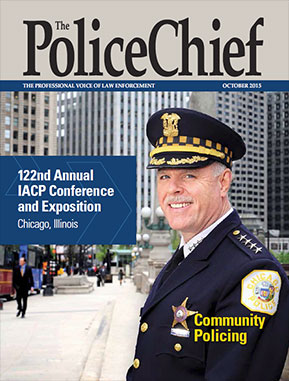
October 2015
The 122nd IACP Annual Conference and Exposition will take place in Chicago, Illinois, on October 24–27, 2015. IACP 2015 includes more than 200 education sessions, numerous networking opportunities, and an expo hall with nearly 700 exhibitors. This issue provides updated information for attendees and tips on how to get the most of largest and most important law enforcement event of the year.
As law enforcement professionals know, community policing is an important element of today’s policing landscape. Ranging from the Broken Windows theory to partnerships to help specific communities such as military veterans to employing volunteers, community policing is of relevance to every law enforcement organization.
Cover photo provided by Chicago Police Department.
Articles
-
The Five-Legged Stool: A Model for CIT Program Success
A Crisis Intervention Team (CIT) program, based on the "Memphis Model," is an innovative program designed to effectively assist individuals in their communities who are in crisis due to behavioral hea... -
Citizen Advisory Boards in Contemporary Practice: A Practical Approach in Policing
Democracy is a core value of U.S. society, and citizens have a fundamental right to participate. In addition, it has been widely argued that citizen participation in governmental policy making produce... -
It’s Time—A Commitment to Community Policing
Over the past 30 years, policing has made the challenging move from an occupation to a profession. The advancements in the uses of technology, heightened requirements in hiring processes, higher level... -
Reserve Policing in the United States: Citizens Volunteering for Public Service
Reserve and auxiliary law enforcement volunteers are an understudied but potentially valuable asset to communities and criminal justice agencies. Recently, this area of policing has been under the mic... -
Product Feature: Innovation on Display at IACP 2015
-
Unconstitutional Policing: Part 2—Minimizing Liability Strategies That Start and End at the Top
learly, if there were a template for success that police administrators could strictly adhere to, the stressors, politics, and potential legal liabilities associated with leading police organizations ... -
Collaborative Reform in Spokane, Washington: A Case Study and Its Implications for Police Reform
In March 2006, Spokane, Washington, police officer Karl Thompson responded to a robbery call at an ATM. Arriving in the area, Officer Thompson observed an individual who met the suspect’s descriptio... -
Broken Windows and Policing
There have been three primary phases in the recent history of U.S. policing. The political era (1840–1930) was characterized by close ties between police and politicians with an emphasis on appeasin...
Columns
- Chief's Counsel: Law and Liberty: The Guaranteed Freedoms in the United States Bill of Right
- Technology Talk: A Look Back at a Remarkable Career
- Legislative Alert: IACP Meets with Law Enforcement Task Force
- From the Director General: A World of Change; A Decade of Challenge
- Highway Safety Initiative: An Enhanced Statewide Approach to Commercial Motor Vehicle Traffic Safety
- LODD October 2015
- October 2015 Products & Services
- Officer Safety Corner: Chief, Is There a Doctor in Your House? The Evolution of Law Enforcement Operational Medicine
- Research in Brief: Confronting Commercial Sexual Exploitation and Trafficking of Minors in Juvenile Justice
- IACP Working for You October 2015
- Product Feature: Innovation on Display at IACP 2015
- President’s Message: The Year in Review-October 2015

